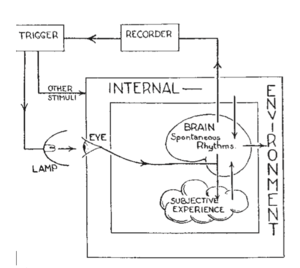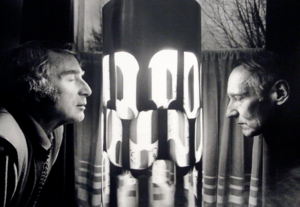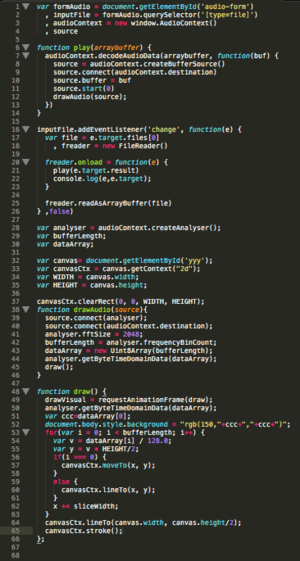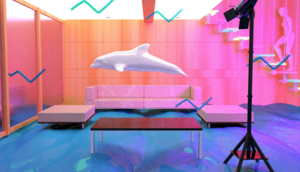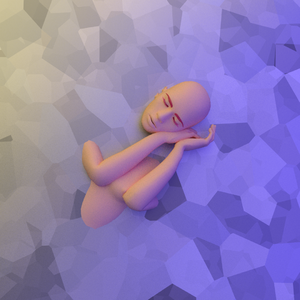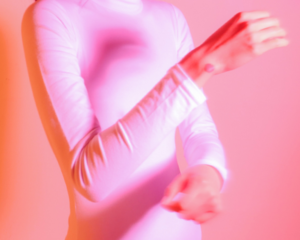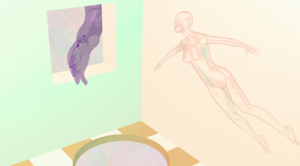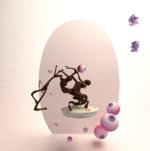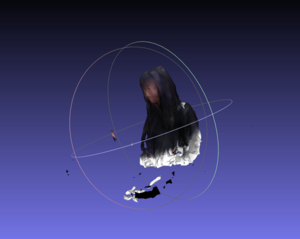User:Stonestone/RWRM-06
Introduction
My thesis is about my work. I have been working with still and moving images. In this thesis, I will discuss the style and techniques I use and what motivates me to make work. Since the beginning of 2016, I started make 3D images using Blender, MakeHuman and the other software, and photography to make images of female bodies in soft, bright colours. This process began with a series of works called ‘space out’, in which I aimed to make people feel more relaxed. I became interested in how my art could change the way people feel. As part of this process I researched the Gysin, Burroughs Dreammachine. I will also discuss my current project Human Bonsai - Vividly Dead in relation to previous work and to work by others that has influenced me.
Previous Works
Dream machine
Intro
On October 27th in South Korea, the first ever Space-Out Competition was held, which would be one of the most peaceful competition in the world. Candidates must maintain a certain and stable heart rate while being in a status of space-out. Finally, a nine-year-old elementary school student Miss Yang won the big prize. This “competition” gives me an initial idea of doing a research/project about space-out experience. During the competition, hundreds of candidates sat in the same piece of grass, going to different "spaces". Space-out, as one of the most commonest experience for everyone has its special attraction for me, because people all experience it, however, I will never know exactly what is the experience for others.
Space-out is a feeling that people can never tell exactly what is by themselves which can be seen as the soul leaving the body.
The views that people see in front of them when their minds escape from their bodies, are diverse and different from the others and difficult to tell clearly. However, the trigger points of space-out are quite similar, drugs, alcohol even some specific visuals, for example. Dreamachine, as one of the most critical patent of triggering space-out, also known as a piece of art work, is a good example to explore the phenomenon of space-out. In this essay, I will give my research on how dreamachine make efforts on people and why people get the feeling of space-out.
History
“Flicker” is a long-standing term of art in experimental psychology, referring to visual effects induced by flickering lights.
The first record of inducing hallucinations by flickering light emmerged can be traced back to 1564.Nostradamus conducted Flicker experiments, he was inspired by the legends of Lucrezia Borgia and the subtle magic of 'photic-entrainment' by flames she employed to access visionary divinations, and predict future events.
The first stroboscope was invented in 1832 by Belgian scientist Joseph Plateau. He used slotted disks turning at turning at high speeds to provide an image with an illusion of movement. Then the invention of the Electroencephalograph was made in 1924. German psychiatrist Hans Berger worked on human EEG, his main topic was to search for " the correlation between objective activity of the brain and subjective psychic phenomena and to understand the mysterious relation ship between mind and matter." Then he found Alpha wave."A rhythmic oscillation of potential at a afrequency of 10 cycles pre second .. detected in the human subject by electrodes applied to the head .. present when the subject lies quietly with eyes closed and disappearing when attention is fully occupied."
In 1945, Dr. W. Grey Walter applied flicker into his EEG research, in the end an electronic stroboscope was invented. After an experiment in a big range of people, Dr Walt got the feedbacks (strange feelings) from samples he chose, which were:" faintness or swimming in the head"; "unresponsive or unconscious for a few moments"; "the limbs jerked in rhythm with the flashes of light."
Most of the feedback pointed into epileptic symptoms.A feedback apparatus was built in order to figure out how the flicker trigger works on our brain.
As shown in the diagram on the right, eyes receive the lights from the strobes (lamp) as an subjective experienced signal which is transmitted to our brain, then, the signal (brainwave) goes through the recorder make efforts on the trigger.This loop can be seen as the basic prototype of how the visual flicker we look at works on our brain.
" We all noticed a peculiar effect . . . a vivid illusion of moving patterns whenever one closed one’s eyes and allowed the flicker to shine through the eyelids. The illusion . . . takes a variety of forms. Usually it is a sort of pulsating check or mosaic, often in bright colours. At certain frequencies—around 10 per second—some subjects see whirling spirals, whirlpools, explosions, Catherine wheels. "
Dr Walter noted after experimented with strobes on himself.
Dreamachine
Spaceout:
https://pzwiki.wdka.nl/mediadesign/User:Stonestone/secondessayfort2stone
In the post-World War II era, the Beat Generation rediscovered the drug-like strobe-machine by reading Dr Walt's book The Living Brain. It starts with an experience of Brion Gysin, a painter, writer, sound poet, and performance artist born in Taplow, Buckinghamshire. In his dairy he wrote:
" Had a transcendental storm of colour visions today in the bus going to Marseilles. We ran through a long avenue of trees and I closed my eyes against the setting sun. An overwhelming flood of intensely bright colors exploded behind my eyelids: a multidimensional kaleidoscope whirling out through space. I was swept out of time. I was out in a world of infinite number. The vision stopped abruptly as we left the trees. Was that a vision? What happened to me? "
After reading Dr Walt's book The Living Brain which was lent by William S. Burroughs, Gysin had found the answer. That is also the critical point of the relationship establishing between Flicker and Dreamachine; Walt and Gysin. Afterwards, Gysin built the Dreamachine in the early 1960's by putting a cylinder with holes onto a record player turn tablewith a 100 watt lightbulb in the middle. When the record player being set to spin at 78 round per minute, the strobes turns into the visual of sitting in a bus and passing shades of leaves under the sun, which makes the light flickers at a frequency of about 20Hz Alpha brainwaves which are associated with subconsciousness. With bringing the changes of brainwaves to people, dreamachine is displayed as an art piece in by Brion.
Brainwaves
Brainwaves has been mentioned earlier, which plays an important role in space-out experience. The blinky lights made by dreamachine produce about 20 hz brainwaves in our brain, in a way, it is within or close to the range of alpha wave( in a range around 8 -13 Hz ), which will bring people the feeling of deep relaxation, vice versa. Besides alpha wave, there is also Beta wave, Theta wave and Gamma wave which show or make different efforts on our brain. .
Background Story of Nosebleed:
Nosebleed is a video work which shows the views that people might see when they get nosebleed suddenly (skies and the top part of the building) when they are walking on the street. In order to bring the space-out feeling for the people who might see the work, the most efficient way is to create alpha wave as a key to bring people the similar experience of Flicker and Dreamachine in it with the strobe effects like Dreamachine.
For the first attempt, I downloaded an alpha wave meditation video on youtube, and put the sound into a program I made (http://pzwart1.wdka.hro.nl/~ying/404/thatwave.html) using Web Audio API. This program is able to calculate the data of the sound and then, visualize the data into different colours in order to bring the blinks by colour fast changing.
It did results in something blinky, but the question is: if it is the real alpha wave frequency. As a matter of fact, people can only actually hear the sound between the range of 20Hz to 20000Hz frequency by ears, so there is no one can hear an alpha wave sound. When I thought I should give up the idea of creating alpha wave blink because the alpha wave audio is a fraud, I found the origin of the special sound in the youtube clip - "Binaural Beats".
Binaural beat is an auditory illusion perceived when two different pure-tone sine waves. Both of these two waves have frequencies which are lower than 1500 Hz, and the difference between them are less than a 40 Hz, are presented to a listener at the same time, one goes to left ear and the other one goes to right. For instance, if the left channel is 500Hz pure tone, the right channel is 510 Hz pure tone, as a result, the listener will get the auditory illusion of a third tone (a frequency of 10Hz which being the difference between the 500Hz and 510Hz), in addition to the pure tones played to ears. Binaural beat is the third sound.
It gives me a new perspective of grabbing alpha wave data -- creating video works based on thedreamachine's principle of producing alpha wave (flicker) and using the data of Binaural Beats which would produce alpha wave frequency.
For experiment, I upload a piece of sound [1] which produces Binaural beats third tone pitch frequency (from 7 Hz to 12.9 Hz which is right in the range of alpha wave).
Dreamachine, as the most important reference of my project "Nosebleed" gives me a chance to create the space-out experience in my work.
I built up one dreamachine and tried to figure out wh/howy it work s(or if it works or not).
http://vimeo.com/165968701
After really tried it, from my perspective, I saw a lot of different shapes, and did had the feeling of relaxation. All the templates I found online are cut in the same shapes. However, in my point of view, the shapes matter less than the flickery. Then, based on this observation on my own, I created the prototype of Nosebleed (website -> http://stonestone.nl/0510/NorthernSky.html). Users can upload the Binaural Beats and then watch the flickery sky.
Conclusion
To sum up, the illusion from dreamachine is created by the alpha wave, which is one of the brainwaves which could bring relaxation status to people. To create a space-out experience is (kind of) equal to finding a way to create alpha wave. The filkery light which I would like to apply on my own work can be come true by using third tune(Binaural Beats). Binaural beats could be a trigger of alpha wave which has a certain frequency the same as alpha wave.
Plastic
Last winter, I took a series of photos of my friends. (add pictures)
It was the start of me focusing on using pastel colors and girls bodies as the main elements of my projects.
In those pictures I used multiple flash lights with colorful filters on them. The direct lights and shadows shows different colors on the background and different parts of models' bodies.
(add exhibition pics)
Touch(less)
Touch(less) is a project of me in the beginning of using 3d images. In this project, I used 3D human models as main "characters" showing the state of the moment before two people touching each other in order to show a feeling of isolation of our living.
By using specific transparent materials, people become fragile as a piece of plastic. People floating in an unknown space, it is hard to tell which side is inside, which side is outside. Using this concept, I want to emphasize the sense of fear and isolation.
(add pictures later)
The reason why I made this work is because I wanted to create a feeling of isolation from the world as a reflection of our society. It is a crowded, colorful and noisy world, however, the relation between individuals seems going further and further. People want to touch each other but actually cannot really reach each other.
I want to show this feelings and unstable states to people, with soft and colorful visuals to enhance and make the images less dramatic but more peaceful, which is more about my perspective of aesthetics of a slightly sad image, which are peaceful and cruel.
Grad Project
Related previous work
Recently, I started my daily project, which is to make an (moving and still) image (100 in total). The elements of these images are mainly human bodies (females), animals. I made a prototype of website to put my works and will push it online, on which I can easily show them to people especially for some animated (moving) images by using .gif format.
It becomes a diary, reflecting the moods and state of mind of a specific moment of the day. For instance, on Day 4, the main character of the image is a sleeping woman. The reason why I made this is because on that day, I was working with 2 sleepy friends, they slept besides me, etc etc. .
This is a part of my method of making things, focusing on small things at a time, instead of making a big theme and get nothing to say eventually.
Hopefully, after I finish this project, I can see clearer what I can do for the following project which might be a funny and experimental, chaotic short film.(see below for Refs.)
Looking back, I have always used moving image, video as a media for my works. For these works, I use a particular color palate which are "girlie", bright, ice cream, gradient colors.
Colors
Since there is no strong contrast behind those colours, they do not make any conflict in the images, which engender a peaceful state of mind, no dramatics, and always bring peaceful and soft feelings to people.
Bodies
Human bodies are always the most important part of my works, especially females.
Firstly, I think I understand girls and I prefer female bodies to mens, I like a fit body that has curves (rather than the angular bodies of men), which strengthens the softness of the images.
Although, the forms of my works have been changing all the time, there are always similarities in between them.
Feeling
Last research of mine is "Space Out Experience", which was also about making a peacful state of mine in the viewer. I am always interested in things which can make people feel relax.
Human Bonsai - Vividly Dead
My graduation work will follow three formal tracks which I have worked on in the work described above
1) Colors
2) Human (female) figuration
3) The manipulation of form
As with previous work, the aim is to solicit a relaxed and not too dramatic feeling.
The work will be a series of images and animations of bonsai trees which use the human bodies. Vividly Dead relates to my culture (China) combines my interest in photography and video.
Introduction
My project
This project is combined with still and moving images, to create a world of Human Bonsai.
It is the only Bonsai image I made without thinking but somehow made me think more. It can be a reference of this project to you who are reading it.
Combination of 3d, 2d, photography and video. I will make human I shoot become a Bonsai by deform (post production) and paint.
Bonsai
Bonsai (tray planting)is a Japanese art form using trees grown in containers. Similar practices exist in other cultures, including the Chinese tradition of Penjing from which the art originated, and the miniature living landscapes of Vietnamese. The Japanese tradition dates back over a thousand years.
Bonsai is from China, me as a Chinese, it comes into my life more or less. Just like the title, Vividly Dead, Bonsai is made by alive plant, but deformed by people. The way it grows, the shape it looks, even the meaning of its life are planned by people. It is a reflection of nature which is artificial, beautiful, imaginary, pretended. Then I think of myself or most of people, we are also a Bonsai planned by the world's rules, the way we grow, the clothes we wear, the face we make make us become "beautiful" and "meaningful" people.
Therefore, I want to make people which made by world, become into Bonsai which is a world we make.
What Makes Human Human
Technology is an element that changes people: The Bonsai piece is a development of the previous projects, for instance in my work for example 'touchless' which is a series of transparent people that try to touch each other. It is as if people are starting to make a virtual world for themselves (se); I used a lot of soft gradient colours, which reflects societies impression of what girls should look like. There is an issue of power here, society dictates how people should be: Chinese people, like myself, should behave in a particular way; Germans should be serious Ect. This means, ultimately, that diversity of society will be reduced by these stereotyped impressions.
Human as bonsai from my point of view, are deformed by developments of our world. To be specific, the developments are: development of technology(invention of cell phone, internet, ...), changing aethetics(fashion trends on different things), traditions(different cultures) ... .
How
I would like to make a series of pictures and matched videos with interviews to show that people become plants by different development of our society. Each plant human have their own problems.
Visual:
I would like to take photos of people and also scan them into 3d models. I put them into specific spaces which are unrecognizable and virtual spaces.
1)Still:
Overview of human bonsai.
2)Moving:
Close-up of subtle movement of human bonsai.
Fictional interview of me asking them specific questions depending on different themes.
Plan
1) November-December: Begin experiments with myself as a model (body, face,hair,hands. This will represent a technical challenge to determine the style of this work. I want it to be special: ho can I make it special? is the question I want to follow.
2) December- March: get models and assistants together: preferably, I would like as models special looking people with distinctive bodies and different tones of skin and hair, for this I will draw on friends and acquaintances. I will seek the assistance of a hair stylist and ceramicist. I will experiment with painting on bodies
3) December- June: Make the photos and short looping animations, which will be shown in a series.
4) Late June, early July: Graduation Show
Series of prints on one wall will be framed and one projection on another wall; there will be a bonsai in between them.
References
Johnathan Monaghan
http://jonmonaghan.com/
He makes animations that are peaceful and make no sense, always uses architectural features (old buildings or interiors). He also uses animals like cows, deers, bears and horses etc. . They are not symbolic or iconic, they seem devoid of importent issues. The image is all. You don't need to think to much, just feel something.
kyttenjanae
http://kyttenjanae.tumblr.com/
She makes 3d artworks using human body and colorful visual. Her works are full of colors and you can always feel something behind the images. From her work, I saw the possibility of using colors and human bodies.
Blake Kathryn
http://blakekathryn.tumblr.com/
Beeple
http://www.beeple-crap.com/everydays.php
Stone's Wiki Page https://pzwiki.wdka.nl/mediadesign/User:Stonestone/_nosebleed
Nic Sheehan, Flicker, 1997, Documentary, 1:12:02
B.C. ter Meulen D. Tavy B.C. Jacobs, From Stroboscope to Dream Machine: A History of Flicker-Induced Hallucinations, Eur Neurol 2009 pp316–320
Thomas Budzynski, Ph. D., The Clinical Guide to Sound and Light, 2006
David Siever The Application of Audio-Visual Entrainment for the Treatment of Seniors 2004
Luciana Haill ICT & Art Connect : Revelations by Flicker, Dreamachines and Electroencephalographic Signals in Art
http://www.permuted.org.uk/Flickers.htm
http://www.slideshare.net/holcombea/uws-june2013for-slideshare
http://briongysin.com/


